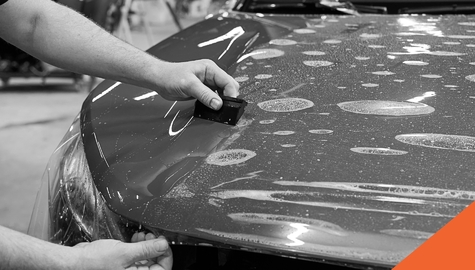New Apartment Checklist for Apartment Hunting
Wednesday, 15 July 2020
As you experience life changes – moving in with a partner, starting over in a new city, or striking out on your own to become more independent, it’s exciting to find that perfect place to call home. Apartment hunting might feel like an overwhelming process, which is why we’ll share this new apartment checklist to get you started on finding the perfect place to call home. We will also discuss some apartment hunting tips and questions to ask when you check out a potential property.
The New Apartment Checklist Starts with Knowing Your Budget before You Start Apartment Hunting
Before you start looking for apartments, consider what you can afford based on your income so that you know your price range. Generally, we recommend spending no more than 30% of your income (before taxes) on rent. One of the approaches to budgeting is the 50/30/20 rule, which suggests the following allocation of income:
- 50% on Needs – this includes rent, utilities, groceries, debt repayment
- 30% on Wants – things such as as eating out, shopping, and hobbies
- 20% on Long-term financial goals – this can include savings and retirement
This budget approach can be adjusted to suit your needs, but make sure you aren’t living beyond your means – your “wants” should be the first thing to sacrifice in tight times. When you are apartment hunting, find out details that will impact your budget before you go and see the place and consider the costs for utilities, moving costs, etc. The worst thing would be that you fall in love with a place and then discover it’s beyond your budget once you factor in the other costs. Keep reading for a New Apartment Checklist of questions to ask!
Start with the Best Apartment Hunting Websites in Your Area
There are so many apartment hunting websites that have user-friendly interfaces and are updated in real-time. Most people start with Craigslist, or Kijiji, but also consider Zumper, and HotPads.
Whichever search website you choose, stay on top of the listings because hidden gems disappear quickly. Some of these newer sites and applications can send push notifications to your phone to let you know when a new property comes up. Check your email and websites often to avoid missing out on your dream apartment.
Finally, ask friends and colleagues, use your social network sites, and research school alumni sites for potential leads. If you’re looking for a roommate, this is also a great way to find one!
Make a Spreadsheet for Your Apartment Hunting Adventure
Spreadsheets are for more than just your budget! An apartment hunting spreadsheet can help you compile a list of all the places you find in your online search. These are the types of columns we recommend: Price, Location, Parking, Pets Allowed, Amenities (Gym/Pool, etc.), Distance to Public Transport, Nearby Stores, any Additional Notes. Also add a checkbox when you have confirmed by phone that the listed information online is correct. When you can visually see your options, it can make your decision easier as you move to the next step: visiting apartments!
Questions for your New Apartment Checklist
Whether it’s your first time looking for an apartment, or you have gone through the process before, you will have questions about the properties you intend to check out. Either way, the information you get from the answers will help inform your decision. Some of these questions might change based on your situation, but when you check out the prospective property, have these questions on hand – on your phone, printed off, or save this blog to remind you.
- What are the lease terms? Is it month-to-month, 6 months, annual, bi-annual? What happens if I break my lease early?
- Are there any income requirements? (Some apartments require that you make up to 4 times the annual rent.) Can a guarantor co-sign if I don’t meet the requirements?
- Are any utilities included? If not, ask for the average monthly cost of utilities. Are they flat-rate, per unit, or split equally through the building?
- Is there access to storage onsite? Is it an extra cost?
- Is there laundry in the unit or onsite? What coins do the laundry facilities take?
- Do you require first and last months' rent upfront? Do you need a security deposit?
- What is your pet policy? If pets are allowed, does it come at an additional charge?
- What is your guest policy?
- Do you require tenant insurance?
- Are there any restrictions for moving? Can the elevator or freight entrance be rented for move-in and move-out? Are there any fees associated with reserving an elevator for moving?
- Can I make permanent or temporary changes to the apartment?
- What are the payment options?
- How do you handle repairs, especially in an emergency? Is maintenance 24/7? How quickly do they respond?
- What security measures are in place for the property?
- How often does rent increase? By how much?
Phew! It’s a lot of questions, but it’s important to cover all your bases before you commit to a huge financial and life decision.
A Few More Tips When You Visit the Apartments on your Search
- Try to schedule as many appointments in a short time frame – either a day or weekend to check out all the potential places.
- Take the time you need to choose your new place. Give yourself permission to walk away if it’s not a good deal or you need time to think about it. Don’t be afraid to negotiate the price – the worst the landlord can say is no.
- If you are seriously interested in a place – say it! Telling the landlord will affirm your interest and keep you at the forefront of their minds as a prospective tenant.
Ready to Sign the Lease? Use this New Apartment Checklist!
When you have finally found the perfect apartment for you, it’s possible that you will need to sign an application or lease papers on the spot to get the place. Use this new apartment checklist with the documents you might need to secure your new home:
- Recent pay stubs, letter of employment, or a dated bank statement (or bring all three in case the landlord prefers one over the other)
- 2 pieces of government-issued photo ID (driver’s license, passport)
- Rental history (if applicable)
- Letter of recommendation from a previous landlord, or contact information from a professional reference
- Social Insurance Number – your landlord will use it for a credit check
- A check or cash, in case you need to fill out an application form with a fee (generally $50-$100)
After Apartment Hunting: Get Tenant Insurance
Once you find the perfect place and sign your lease, speak to an insurance broker about your options for Tenant Insurance. Tenant Insurance (Renters Insurance) provides coverage for your personal property in the event of things like a fire, flood and even theft. It may also cover injuries or liability claims that happen within your apartment. Tenants insurance costs very little, so it won’t significantly affect your budget, but will provide peace of mind that your contents are covered. At BIG, we can get you a no-obligation quote for your new place and you might qualify for discounts if you bundle your property and auto insurance together. If you have any questions on what contents would be covered or how much coverage you need, speak to one of our insurance brokers here at BIG. Contact us for a quote today!



